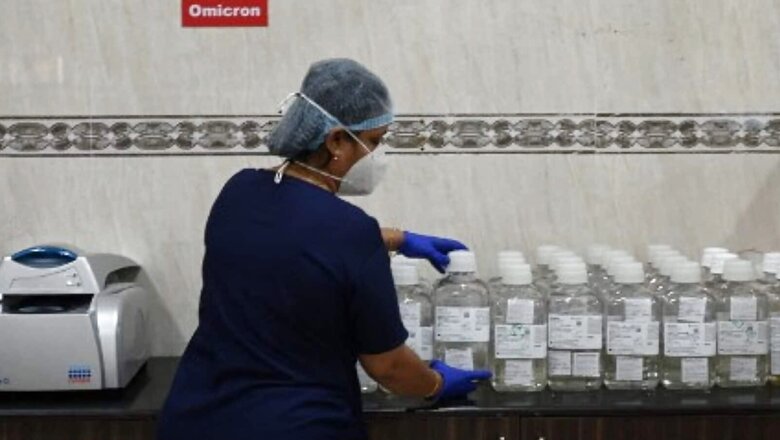
views
The World Health Organization, in its latest epidemiological update, said there was early evidence that the Omicron variant of the novel coronavirus might be spreading faster than the highly transmissible Delta variant. But it was, however, too early to say if it was as deadly.
According to the international health body, the new variant has now been reported in 57 countries with that number expected to grow. At the same time, the WHO also said only more data in the coming weeks could determine the impact it would have on the Covid-19 pandemic. Besides, crucial questions about the variant still remained unanswered.
The comments come amid concerns over the new variant that first emerged in southern Africa last month, prompting some countries to re-introduce travel bans and restrictions. Globally, the virus has reportedly infected at least 267 million people and killed more than 5.2 million.
Here are the four major concerns highlighted by the WHO in its weekly update on the Covid-19 pandemic:
TRANSMISSION
The WHO said certain features of Omicron, such as global spread and large number of mutations, could have a “major impact” on the pandemic. According to Dr Tedros Adhanom Ghebreyesus, director-general of the WHO, Omicron was detected when Delta transmission was “very low” due to which it had little competition. While in South Africa, the number of Omicron cases were increasing quickly, it was important to globally monitor the variant to know if it could “outcompete” Delta, he added.
“Exactly what that impact will be is still difficult to know. We are now starting to see a consistent picture of rapid increase in transmission, although for now the exact rate of increase relative to other variants remains difficult to quantify,” said Dr Ghebreyesus.
The WHO has called on all countries to increase surveillance, tracking and testing, and said existing diagnostics worked to detect the new variant.
The WHO had reported a 79 per cent rise in infections in South Africa last week, but it was not clear whether the increase was due to Delta or Omicron. Maria Van Kerkhove, technical lead for Covid-19 at the UN health agency, said while there was definite transmission increase in South Africa and around the world, there were some challenges on knowing how much this was circulating because sequencing was needed to determine the variant.
She said, however, that the WHO was looking at how the Omicron variant would circulate in different populations. In South Africa, for example, a wave with Delta infections had just finished due to which the transmission of the variant was low. With the emergence of Omicron where Delta was low, the new variant took off and is increasing transmission of Covid-19 in the country.
“Now what we have to look at is how Omicron will unfold in populations that have Delta circulating at high level, what will actually happen as Omicron competes with Delta and whether we’ll see the same increased growth rate and number of cases over time,” said Kerkhove.
Dr Michael Ryan, WHO’s chief of emergencies, said data about the Omicron variant, so far, is pointing to a virus that was efficiently transmitting and probably more efficiently transmitting than even the Delta variant, which is by far the most widespread and deadly version.
SEVERITY
There is also some evidence that Omicron caused milder disease than the Delta variant, but then it was too early to be definitive, the WHO said. “Any complacency now will cost lives. Many of those who don’t die could be left battling long Covid, or post-Covid condition, a disease with debilitating, lingering symptoms that we are only beginning to understand,” said Dr Ghebreyesus.
The WHO also called for more countries to submit more data on its clinical data platform to help build a clearer picture of the severity and symptoms caused by Omicron. The joint advisory group on Covid-19 therapeutics prioritisation was also analysing the possible effects on treatment of hospitalised patients.
Kerkhove said it was too early to determine the severity of disease caused by Omicron, saying there was only anecdotal information about that for now. “We certainly have information from South Africa that many of the patients that are identified with Omicron have a more mild course of disease,” she said, adding, “but it does take time for people to go through the full course of their infection.”
RE-INFECTION
The WHO also said incoming data from South Africa showed that with Omicron, there was an increased risk of re-infection. But more data was needed to draw firmer conclusions, the organisation stated.
On the risk of reinfection, the WHO said: “Preliminary analysis suggests that the mutations present in the Omicron variant may reduce neutralising activity of antibodies resulting in reduced protection from natural immunity.”
IMPACT OF VACCINES
The WHO said the technical advisory group for Covid-19 vaccine composition was assessing the impact of Omicron on current vaccines and determining whether changes to vaccines were needed.
Sticking to their stance that booster shots should be a secondary priority, WHO officials said it was more important to administer first doses to people in places that had relatively little vaccination coverage. Dr Soumya Swaminathan, chief scientist, said wholesale boosting was not the solution right now.
In an allusion to policies in hard-hit Europe and the US, she said, “The data from country after country after country is showing that the people who are in the ICUs, the people who are severely ill, and the people who are dying are the unvaccinated. I think the message is loud and clear that it’s a primary course of vaccination that is going to protect against severe disease and death — that has to be our goal.”
The WHO said there was a need for more data to assess whether the mutations present on the Omicron variant might result in reduced protection from vaccine-derived immunity and data on vaccine effectiveness, including the use of additional vaccination doses.
Asked about the vaccination targets set by the WHO, Kate O’Brien, director (immunisation, vaccines, biologicals) of the WHO, said, “Our concern about the situation with the Omicron variant really is that we’re in a Delta pandemic right now, even as we are working and watching very carefully what’s going on with the new variant. There are over 50 countries that are unlikely to meet the target of 40% vaccine coverage. This is primarily about supply and it’s not about supply in the past month or six weeks; this requires a programme over weeks and months. We can now see the cumulative effect of the supply constraints over the past year but there has been a significant increase in supply through Covax, especially to those countries that need it.”
On Wednesday, Pfizer said a booster dose of its Covid-19 vaccine might protect against the new Omicron variant even though the initial two doses appear significantly less effective. Pfizer and its partner BioNTech said lab tests showed a booster dose increased by 25-fold the level of so-called neutralising antibodies against Omicron. The preliminary laboratory data, however, has not yet undergone scientific review and companies are working to create an Omicron-specific vaccine in case its needed.
O’Brien said, “We are aware of the results and interested in the findings and preliminary results. We look forward to early reports out of South Africa on Pfizer’s mRNA vaccine to see if these results can be replicable. Right now, vaccination of all those at highest risk from the disease is priority.”
(With inputs from AP and Reuters)
Read all the Latest India News here



















Comments
0 comment